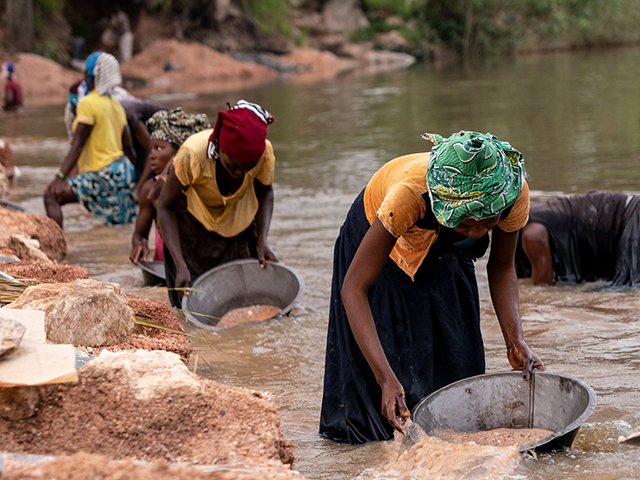The Chinese government is so concerned about the potential for kidnappings of Chinese workers and businessmen in the Democratic Republic of Congo (DRC) that it sent a delegation of top criminal investigators to met with Congolese officials and shore up security in the African nation, according to a Thursday report from the South China Morning Post (SCMP).
The delegation from Beijing was headed up by the chief criminal investigator for the Chinese Ministry of Public Security, Liu Jingjie, while the Congolese side of the bilateral meetings was led by Deputy Prime Minister Gilbert Kankonde Malamba, who is also the DRC interior minister.
China has vast interests in the DRC, particularly in cobalt mining, which is vital for manufacturing batteries. Congolese mines furnish 60 percent of China’s cobalt, and 70 percent of the worldwide supply.
The Congo is also a dangerous place, with violent insurgencies boiling in the North and South Kivu provinces. Militants and gangsters have a predilection for kidnapping to finance their endeavors and perk up the morale of their rapacious troops. Kidnapping victims in the DRC are often hideously abused, as in the June 2022 case of a woman who was raped by her abductors and forced to eat human flesh.
As the SCMP noted, the last high-profile kidnapping of Chinese nationals occurred in November 2021, when five of them were abducted by gunmen from a gold mine in South Kivu province. The DRC government announced the five had been freed in June 2022 after “negotiations with the kidnappers,” but did not disclose if a ransom was paid.
Also in November 2021, two Chinese nationals were killed when an insurgent militia group attacked another gold mine in the Ituri province. The attackers kidnapped several people from the mining camp.
There may have been other incidents that were not publicized, or the Chinese government could have intelligence that suggests the risk of attacks on its nationals is increasing. The Chinese embassy to the DRC delicately described the security situation in the eastern provinces as “severe and complicated,” and advised Chinese companies to evacuate their personnel as quickly as possible. The embassy also warned Chinese working in the southeastern mining areas to take precautions against a rising tide of armed robberies.
“Violent conflicts have escalated, resulting in many casualties. Armed groups such as the M23 have caused large numbers of casualties and millions of displaced people,” Chinese Ambassador to the United Nations Dai Bing said on Sunday, referring to one of the more bloodthirsty Congolese insurgent groups.
Security analysts quoted by the SCMP doubted there was any great political significance in the targeting of Chinese nationals; gangsters and militants in the DRC apparently favor them for kidnapping and robbery simply because they tend to carry large sums of money.
Analysts said China was reluctant to deploy troops to protect its interests for political reasons but might skirt very close to that line by sending in “special police units” and “security contractors” with paramilitary training and equipment.
Beijing’s preference is to assist with training and equipping African security forces, although China also controls at least 32 police and military outposts across Africa, from which small security teams can deploy when Chinese nationals are threatened.
A report submitted to the U.N. Human Rights Council (UNHRC) on Wednesday warned human rights in the Congo are imperiled, and not just from armed militant groups.
The report noted that 44 percent of documented human rights violations over the past year were perpetrated by the DRC military or Congolese National Police, while the government has used the unstable security situation as an excuse to crack down on dissents and journalists.
“Measures taken in the implementation of the state of siege, which came into effect on the sixth of May 2021 in North Kivu and Ituri provinces, do not appear to have deterred armed groups from attacking civilians, particularly in internally displaced person sites. Nor have they reduced the number of documented violations and abuses,” warned U.N. field operations director Christian Jorge Salazar Volkmann.

COMMENTS
Please let us know if you're having issues with commenting.